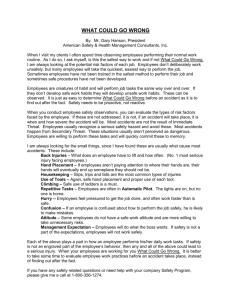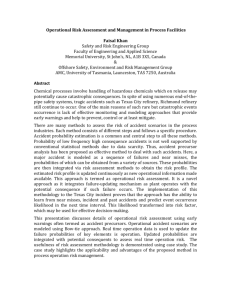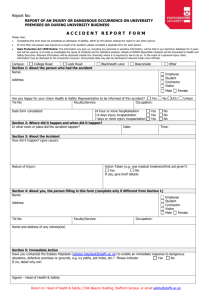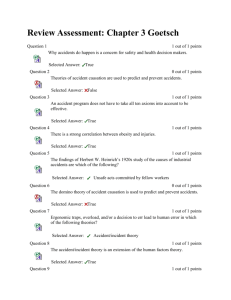Logic Fallacies
advertisement
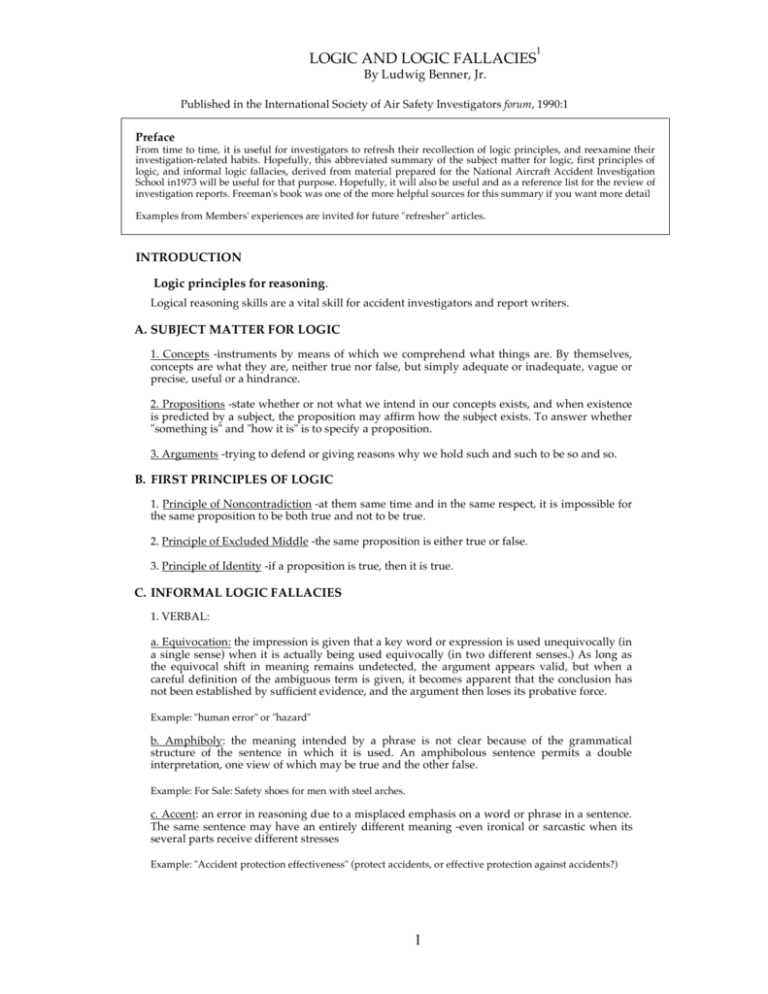
1 LOGIC AND LOGIC FALLACIES By Ludwig Benner, Jr. Published in the International Society of Air Safety Investigators forum, 1990:1 Preface From time to time, it is useful for investigators to refresh their recollection of logic principles, and reexamine their investigation-related habits. Hopefully, this abbreviated summary of the subject matter for logic, first principles of logic, and informal logic fallacies, derived from material prepared for the National Aircraft Accident Investigation School in1973 will be useful for that purpose. Hopefully, it will also be useful and as a reference list for the review of investigation reports. Freeman's book was one of the more helpful sources for this summary if you want more detail Examples from Members' experiences are invited for future "refresher" articles. INTRODUCTION Logic principles for reasoning. Logical reasoning skills are a vital skill for accident investigators and report writers. A. SUBJECT MATTER FOR LOGIC 1. Concepts -instruments by means of which we comprehend what things are. By themselves, concepts are what they are, neither true nor false, but simply adequate or inadequate, vague or precise, useful or a hindrance. 2. Propositions -state whether or not what we intend in our concepts exists, and when existence is predicted by a subject, the proposition may affirm how the subject exists. To answer whether "something is" and "how it is" is to specify a proposition. 3. Arguments -trying to defend or giving reasons why we hold such and such to be so and so. B. FIRST PRINCIPLES OF LOGIC 1. Principle of Noncontradiction -at them same time and in the same respect, it is impossible for the same proposition to be both true and not to be true. 2. Principle of Excluded Middle -the same proposition is either true or false. 3. Principle of Identity -if a proposition is true, then it is true. C. INFORMAL LOGIC FALLACIES 1. VERBAL: a. Equivocation: the impression is given that a key word or expression is used unequivocally (in a single sense) when it is actually being used equivocally (in two different senses.) As long as the equivocal shift in meaning remains undetected, the argument appears valid, but when a careful definition of the ambiguous term is given, it becomes apparent that the conclusion has not been established by sufficient evidence, and the argument then loses its probative force. Example: "human error" or "hazard" b. Amphiboly: the meaning intended by a phrase is not clear because of the grammatical structure of the sentence in which it is used. An amphibolous sentence permits a double interpretation, one view of which may be true and the other false. Example: For Sale: Safety shoes for men with steel arches. c. Accent: an error in reasoning due to a misplaced emphasis on a word or phrase in a sentence. The same sentence may have an entirely different meaning -even ironical or sarcastic when its several parts receive different stresses Example: "Accident protection effectiveness" (protect accidents, or effective protection against accidents?) 1 1 LOGIC AND LOGIC FALLACIES By Ludwig Benner, Jr. d. Division: occurs either when what is true of a whole is predicated of its constituent parts, or when what is predicated of a class or collection is predicated distributively of each member of that class. Example: Accident investigation is a "good” profession, but every accident investigator is not necessarily good. e. Composition: either ascribes the properties of the constituent parts of a whole to the entire whole, or predicates of a class of individuals such properties as belong solely to its individual members. Example: Most accident investigators are very conscientious, but that doesn't mean all investigators as a class are conscientious f. Figure-of-speech: when words or expressions that are similar in form are understood to be similar in meaning. Example: the "leading edge" of investigative technology. 2. RELEVANCE: a. Neglected aspect: to present evidence in support of one side of an issue to the exclusion of relevant evidence to the contrary. The withholding of evidence hostile to the conclusion at hand may be malicious and intentional or due to unawareness. Example: In a suit against a scaffold manufacturer, the victim "forgot" to mention that he had been drinking before he fell off the scaffold. b. Non sequitur: a leap to a conclusion that does not follow from the premises presented in the evidence. The premises may be true, but the just do not constitute grounds for the conclusion attached to them. Example: Most industrial accidents happen in the workplace, so the employer is at fault. c. Ignoratio elenchi: seeking to prove a conclusion other that one demanded by the premises. Example: When one car strikes another from the rear, and both cars leave skid marks forward of the point of impact, don't bother trying to prove that the striking car was stopped. d. Ad hominum: arguing against the motives and the character of the person advancing an argument. Introducing the personality of the opponent when it has nothing to do with the merits of the point being argued. Example: the pilot lied in the past, so he's obviously a liar and is no doubt lying now. e. Ad ignorantiam: shifting the burden of proof by appealing to the ignorance of one's opponent as evidence for one's own position Example: My pilot training program is perfectly fine; my critics don't really understand the aviation business. f. Erroneous appeal to Authority: appealing to someone who is not an authority in the area under consideration as though he were an authority. It is far more serious when an expert is unaware of his or her own incompetence. Example: Ask Charlie, my barber -he flies between New York and Chicago a lot, and he knows how unsafe those airlines are! g. Irrelevant appeal to emotion and sentiment: appealing to popular sentiments of long standing, some of which are legitimate in themselves; also the use of highly emotional terms or question-begging epithets and the introduction of needless technical jargon, popular clichés and slogans cloud rather than clarify, and then distract from the issue. Example: We have got to stop this continuing highway slaughter. 2 1 LOGIC AND LOGIC FALLACIES By Ludwig Benner, Jr. 3. UNWARRANTED ASSUMPTION: A. General Rule: To presuppose what is true in general, under normal conditions, is true under all circumstances without exception. To apply a general rule to situations for which it was never intended is a serious source of error. Example: Regulations prevent accidents, but do they prevent accidents in all cases? b. Hasty generalization: to formulate a general rule or a universal principle on the basis of evidence which warrants a particular conclusion. To assume that what is relatively true under certain conditions is true under all conditions. Example: Recommend an industry-wide drug rehabilitation program because you found a mechanic involved in a single case. c. False cause: the tendency to generalize too quickly can lead to a belief that we have discovered the cause of a phenomenon when we have not. State P is the cause of phenomenon Q if and only if the presence of P always precedes Q. The mere coincidence of two states or a state and a phenomenon does not require that there be a causal connection between them. Reversals of P and Q may also be a source of error: p may be viewed as the cause of Q when the opposite is true. Very prevalent in accident investigations! Example: Non-compliance with FARs (P) causes accidents (Q). d. False analogy: to conclude that since two objector situations are know to resemble each other by sharing some common attribute, the necessarily share a second property, although there is no know connection between them. Example: "struck by" and "falls" both involve energy exchanges that injure: therefore, the accidents resemble each other. Filling in forms with accident data fosters this fallacy. e. Hypothesis contrary to fact: applying a speculative assumption contrary to the observations about the phenomenon. It is not possible to reach a definite conclusion by presupposing a state of affairs contrary to what actually occurred. Example: The pilot had to do something wrong to cause this approach accident, regardless of the sudden drop in airspeed just before the accident. f. Poisoning-of-the-wells: to preclude in advance the possibility of any evidence to the contrary by assuming a position in such a way that nothing can count as evidence against it. Very subtle and frequent in investigations. Example: They were will trained to fight fires, so it must have been human error. (This precludes the possibility of improper training. Watch assumptions!) g. Complex question: to pose as a single question two questions requiring separate answers. Example: During a witness interview, you ask leading two-part questions prefaced by your assumption, and give witness choices that must acknowledge your assumption. h. Contradictory premises: assumption of contradictory premises is an extremely dangerous error, since--after they are assumed--any conclusion can be demonstrated with formal validity. Example: Fining you as a deterrent because you were speeding sometime before the accident; the fine is aimed at controlling deliberate behavior to avoid unintentional results--an accident. Was the accident a crime or accident? i. Genetic fallacy: to assume that the truth or fallacy of a proposition or he adequacy or inadequacy of a hypothesis or theory can be determined by tracing it source or origin. Instead of examining the evidence to support a hypothesis, reference is made to the way it came to be held; if the source is regarded in an unfavorable light, the proposition in question is dismissed without further ado. Example: discounting witnesses' observations because you conclude they are self-serving. 3 1 LOGIC AND LOGIC FALLACIES By Ludwig Benner, Jr. j. Begging-the-question: most subtle form of fallacious reasoning: what is intended to be proven in the conclusion may simply be stated in disguised form in the premises. Example: The famous history of how such a large portion of accidents are caused by "unsafe acts" because 8 out of 10 questions on forms about accidents were about what the driver did. k. Reduction fallacy: assumes uncritically that the various examples of experience are reducible to each other. Example: The generation of accident report forms to gather information that is statistically massaged to reduce accidents to common "determinant variables" or "causal factors." Reference: Logic: The Art of Reasoning, Freeman, D.H., D. McKay Co., New York, 1967 Submitted 11/11/89 (Veterans' Day) 1 The major contributions of Joel Ryan of the National Transportation Safety Board for the1973 National Aircraft Accident Investigation School are hereby gratefully acknowledged. 4
